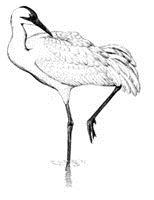North American Crane Working Group

Proceedings of the North American Crane Workshop
Date of this Version
2018
Document Type
Article
Citation
PROCEEDINGS OF THE NORTH AMERICAN CRANE WORKSHOP 14:142-144
Abstract
Diseases such as parasitism can limit the effectiveness of conservation translocations depending on host-parasite dynamics at the site of release. The Rwanda Wildlife Conservation Association and the Rwandan government are rehabilitating and repatriating grey crowned cranes (Balearica regulorum) from illegal captivity to the wild at Akagera National Park in large numbers. Monitoring of cranes at the fenced soft-release site during 4 time points in 2017 showed 50-67% of fecal samples tested were positive for 1 or more parasites, most commonly nematodes (roundworms) of the Order Ascaridida. The prevalences and species diversity observed in the fecal samples were not dissimilar from preliminary surveys of 2 other populations elsewhere in Rwanda, suggesting no new management considerations are needed to accommodate the number of cranes at the release site or during the preceding quarantine period to prevent disease.
Included in
Behavior and Ethology Commons, Biodiversity Commons, Ornithology Commons, Population Biology Commons, Terrestrial and Aquatic Ecology Commons


Comments
Copyright © 2018 North American Crane Working Group. Used by permission.
Proceedings may include articles not presented at Workshop.